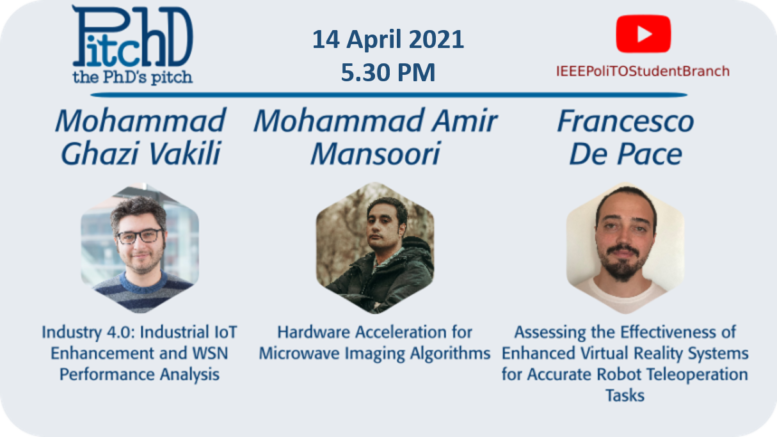14 April 2021 – 5.30 PM CET
ONLINE EVENT
YouTube Live Broadcast
Here’s the 3rd PitchD – the PhD’s pitch. Our PhD IEEE Student Members explain to students, colleagues and professors their research.
Industry 4.0: Industrial IoT Enhancement and WSN Performance Analysis
Mr. Mohammad Ghazi Vakili
Dept. of Control and Computer Engineering (DAUIN), Politecnico di Torino
The term “Industry 4.0” is the current automation and data exchange trend in the manufacturing environment. It includes cyber-physical systems, the Internet of things, and cloud computing, which depict factories as intelligent environments. Their composing elements (e.g., machines, storage systems, edge and system devices, etc.) are seen as smart components, able to communicate with each other and take decisions autonomously. These benefits come when reliable communication is established between the shop floor and the factory’s top floor. Depending on the application, Wireless Sensor Network (WSN) and Internet of Things (IoT) help communicate devices and people with each other, both within the factory and outside it, reaching customers, suppliers, and broader governing bodies. Nowadays, Wireless communication plays a significant role in Industry 4.0. WSNs help factories to gather data and send control commands to the factory shop floor. WSN and IoT relevant challenges guarantee reliable communication in the factory where constrained communication is often required. The talk discusses and explains methods and algorithms to increase performance indicators in Industry 4.0, to have reliable communication between the shop floor and business applications in the factory.
Hardware Acceleration for Microwave Imaging Algorithms
Mr. Mohammad Amir Mansoori
Dept. of Electronics and Telecommunications (DET), Politecnico di Torino
Microwave Imaging (MI) in medical applications is a technique to observe the internal structure of an object by using electromagnetic fields at microwave frequencies. One of the challenges in MI is the high execution time of the image reconstruction algorithms making it difficult to be used in real-time systems. Our aim is to increase the speed of the recurrent algorithms used in MI by means of hardware acceleration techniques. These algorithms include compute-intensive parts which we call “kernels”. In this presentation, I will introduce you some of the most commonly-used kernels in MI and the methodology to design specific hardware accelerators in FPGAs for these kernels by means of High Level Synthesis (HLS) tool. These kernels include a forward electromagnetic solver called FDTD and some Machine Learning classifiers. The performance is compared with CPU and GPU-based designs in terms of processing time, power consumption and resource usage.
Assessing the Effectiveness of Enhanced Virtual Reality Systems for Accurate Robot Teleoperation Tasks
Mr. Francesco De Pace
Dept. of Control and Computer Engineering (DAUIN), Politecnico di Torino
Over the last decade, many studies have focused on Virtual Reality (VR) frameworks for remotely controlling robotic systems. Although VR systems have been used to teleoperate robots in simple scenarios, their effectiveness in terms of accuracy, speed, and usability has not been rigorously evaluated for complex tasks that require accurate trajectories. In this talk, an Enhanced Virtual Reality (EVR) framework for robotic teleoperation is evaluated to assess if it can be efficiently used in complex tasks that require accurate control of the robotic endeffector. The environment and the employed robot are captured using RGB-D cameras, while the remote user controls the motion of the robot with VR controllers. The captured data are transmitted and reconstructed in 3D so as to allow the remote user to monitor the task execution progress in real time, using a VR headset. The EVR system is compared with two other interface alternatives: i) teleoperation in pure VR (the model of the robot is rendered with respect to its real joint states), and ii) teleoperation in EVRR (the model of the robot is superimposed on the real robot).


Be the first to comment on "PitchD 2021 edition: the 3rd PitchD [ONLINE]"